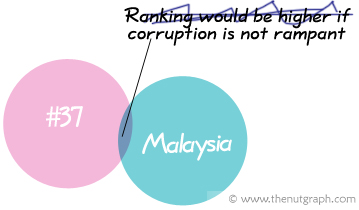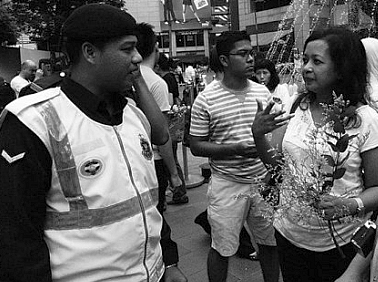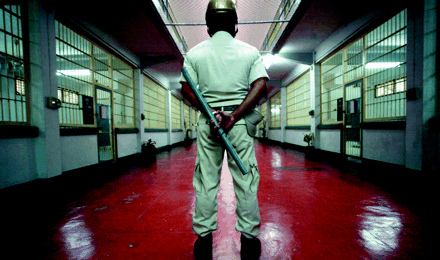
LAST year, the Merdeka Day spirit was dampened by the actions of the Shah Alam residents who used a severed cow head to protest the relocation of a Hindu temple to their largely Muslim neighbourhood. This year, the run-up to Merdeka saw a school head in Kulaijaya, Johor, who, besides other slurs, told her charges that non-Malay Malaysians are just passengers in this country.
These are not the only issues that beleaguer our nation as we celebrate our 53rd year of independence. From race politics to human rights to plunging foreign direct investments (FDI), there’s a whole host of challenges our young nation is facing.
And so, more than half a decade after we gained independence, how far we have come as a nation and where we are headed?
A glossy surface

Of course, there has been progress. Our country is modern, it’s infrastructure admirable. The middle-class has grown while the lower income group is aided with public health, education and housing. We are apparently the 37th best country in the world to live in, and this is supposedly proof that we are not corrupt.
Malaysia has also improved in its competitiveness rankings from 18th place last year to 10th this year, the IMDB World Competitiveness Yearbook 2010 said. That’s progress, considering that Malaysia was ranked 22nd in 2006. The government attributes this improvement partly to initiatives like the Government Transformation Programme and the National Key Result Areas.
We also weathered the 1987 currency crisis, and the 2008 global financial crisis. The local economy is now exceeding expectations, with Gross Domestic Product (GDP) growth hitting 9.5% for the first half of this year, thanks to domestic demand and exports. It’s a good performance and a sign that our recovery is on track, analysts say, given that the rest of the world economy is still struggling with uncertainty.
These are the kinds of indicators the government blows its trumpet over. However, competitiveness rankings merely indicate the ease of starting or doing business in a country. At the same time, GDP figures don’t tell the full story of whether a country’s wealth is being equally shared.
Additionally, do these measurements really tell us anything about the nation’s soul?
The underbelly

There are other indices and reports that suggest another story about Malaysia.
Take the Gini coefficient of income disparity, where a higher score closer to 1.0 indicates greater inequality. It’s been noted that despite the New Economic Policy, we’ve not made progress in reducing the gap between rich and poor, not only between the different races but within the same race.
Our overall Gini coefficient in 1990 was 0.442 and remained on the increase till 2004, when it was 0.462. It came down to 0.441 in 2007. The government plans to reduce the gap to 0.35 by 2020, as stated in the Mid-Term Review of the Ninth Malaysia Plan. But will we get there when suggestions for meritocracy and liberalising the economy are not discussed rationally but instead slammed as seditious?
Then there is data that tells of how we value our women. Malaysian women remain economically disadvantaged. Their participation in the Malaysian workforce hasn’t changed much since 1980, when women made up 44.1% of the workforce. In 2008, female labour participation was only slightly up at 45.7%. And yet, studies have shown that the more women are able to work, the more the economy benefits as do their families.

Women are also increasingly discriminated, especially Muslim women who don’t have the same freedoms as non-Muslim women, activist Datin Paduka Marina Mahathir has noted.
Malaysia intends to have 30% of women in decision-making positions under the Ninth Malaysia Plan. But with only 10% of Parliament comprising women, and 8% of 505 state seats occupied by women assemblypersons, we are below the world average of 16%.
Women’s low participation in the workforce and in politics earned Malaysia 101th place in the World Economic Forum’s Global Gender Gap Index 2009. Malaysia’s ranking on this score has been steadily declining since we were ranked 72 in 2006.
Malaysia’s poor civil liberties and human rights track record is also well-documented, in its treatment of migrants and refugees, handling of human trafficking, and use of repressive laws. There has been little progress whether under prime ministers Tun Dr Mahathir Mohamad, Tun Abdullah Ahmad Badawi or Datuk Seri Najib Razak.

International human rights monitor Freedom House ranks Malaysia as a “partly free” country in its Freedom in the World 2009 survey. In its press freedom rankings for 2010, it ranks Malaysia as “not free” at a position of 141 out of 196 countries, and 31 out of 40 countries in the Asia Pacific. Reporters Without Borders marked an increased score in Malaysian press freedom in 2009, but the country’s position was still low at 131 out of 175 countries.
Telling figures
Our track record on human rights, including political and press freedom, has some impact on our standing in other indices, such as the Corruption Perception Index (CPI), and FDI. Corruption finds a comfortable environment when a government rules without transparency and with impunity, when the media is curbed from reporting fearlessly, when critics are regularly silenced, and when judicial independence is suspect.
So it’s little wonder that Malaysia doesn’t show improvement on the CPI, which gauges the perceived level of corruption in the public sector. We were 43rd place out of 179 countries in 2007 and have slid to 56th out of 180 in 2009.
Corruption is of course not the sole reason why Malaysia‘s FDI has plunged, but it does have a part in affecting confidence. We recorded our largest FDI drop — the biggest decline in Southeast Asia — of 81% from US$7.32 billion to US$1.38 billion between 2008 and 2009, according to the World Investment Report 2010. What a height to fall from when Malaysia was once a regional powerhouse. We are now only just a little better than Cambodia, Myanmar, Laos, Brunei and Timor Leste in attracting FDI.
And not too dissimilar with our brain drain problem, there is also more Malaysian money flowing out (US$8.04 billion) in overseas investments than there is foreign money coming in (US$1.38 billion). Do Malaysians not have confidence in their own country anymore?
Where confidence lies

If there is confidence, it lies in the things that can’t be quantified, like the fact that Malaysians were living as 1Malaysia long before it was made a propaganda slogan. It’s in citizens who take it upon themselves to be peacemakers. Like the predominantly Muslim-Malay group who visited the Hindu temple in Shah Alam that was at the centre of the cow-head protest. Or the Fast for the Nation, Peace for Malaysia event on Malaysia Day, 16 September, in 2009.
Often, it is citizens, not politicians, who make a difference. Indeed, from the indicators cited, it is the politicians in power who seem bent on undermining what this country is capable of.
And so as a citizen, what would you do to make Malaysia a better place? Also, as a citizen, if you could make one suggestion for how the people in power can improve our nation, whether politically, economically or socially, what would it be?
This Merdeka, and onwards, let’s remember that independence isn’t about relinquishing control to the powers-that-be. Independence is about reclaiming power and control over the nation we call home. ![]()
The Nut Graph needs your support


Lindy says
They need to start respecting our intelligence and stop treating us as a nation of imbeciles. Forget the skyscrapers and the massive concrete jungle, all that achieves nothing but a glossy surface. In reality the people are still being held back by an incredibly myopic view that represses our mental progress, and that is fundamental to real progress. Freedom does not exist in dribs and drabs, we are either free or we are not. Malaysia is a beautiful country, and could be a great place to live in – if only we were free to truly explore its potential.
Greg Lopez says
I think it should be the 1997/98 East Asian Financial Crisis instead of 1987 currency crisis.
Hang Jebat says
Naming 31st August “Merdeka” or “Independence” day is really gilding the lily. Let’s call a spade a spade. It really should be called “The day we replaced foreign imperialists with homegrown ones”. It should be a day of national shame and mourning, not one of celebration.
Adam says
Hang Jebat,
I fully agree with you. There is nothing to celebrate. It was ok for 10 years after Merdeka but when that PM took over, it has been down hill all the way till today.
IMHO, we should take 16 September as our Independence Day as it is inclusive of Sabah and Sarawak. And as Lainie Yeoh has said below, West Malaysians should go over to see how our Eastern brothers and sisters live together in perfect harmony. But that may change with UMNO going there and contaminating the people with race/class politics. Real sad.
mnz says
Chandra Muzaffar’s “A Plea of Emphathy” is a good start.
Forget about technologies, forget about joining the Asian tigers. What’s more urgent at the moment is inter-ethnic relation. The gap, the dichotomy between the ethnic groups is simply too big, and its growing bigger. PR is losing Malay support, and politics will once again be ethnically polarized, with mostly Malays on one side of the fence, and mostly Chinese on the other. And I make a stand here that the solution is not political. Bumi’s academic and economic underachievement requires a scientific assessment, not political intervention, from either side of the political fence. Having taught at a public university, I make a stand that the problem is not political or something imagined by the politicians. It’s real and it requires objective studies. Religious fervour especially among the Malays are growing, and stemming this requires scientific, objective studies.
Yes, our country is unique and full of potential. But please understand that Malaysia is not Singapore. You have to deal with an underachieving majority who is afraid of losing out to an overachieving minority. And wherever the majority are Muslims, you have to deal with religious fundamentalism. This is not an ‘easy’ country to manage. Thoughtful, systematic studies and proposals are needed, rather than political rhetoric.
Lainie Yeoh says
I think more residents from the peninsula of Malaysia need to visit Sabah and Sarawak.
M Phung says
I totally agree with Lainie.
There is a very discernible sense of otherness which is not healthy – and totally falls into the model of divide-and-rule. Somehow, it’s not just a visit, like a touristy fly-by that is required, but spending time with one another without any agenda except to know the other. I would dare suggest that such an encounter could possibly encourage, and inspire, the idea that we can make a change.
I will stand up to say that there is a world of difference between the peninsula and Sabah and Sarawak. I’m from Ipoh – very squarely brought up with a typical peninsula experience, and personally had a chance to spend some time off the beaten track in Sarawak. So I will can only vouch for Sarawak personally – but I am quite confident it can apply to Sabah too.
The personal time spent with the people I met – the conversations, the feelings exchanged in listening and in sharing experiences – was very valuable and enriching, the long, short and sometimes just looking at the whole scene. Yes, they are different, more laid back – but ultimately, passionate about their country (whether it be very active and dynamic, or in a more demure and accepting manner), and interestingly sometimes it’s Malaysia, not Sarawak per se.
I can only guess that being personally there was also a personal experience for them too, to let them share their thoughts with a stranger (I had conversations with a lot of Sarawakians whom I did not know before the trip).
It was quite a wake up call, and I think I have never had a richer or more encouraging experience in my life, that was totally unexpected. My personal experience can never be replicated exactly – but the idea entailed can be explored and experienced, and I thoroughly encourage others to try it. I think activities like E.P.I.C. (which I had just read about) could be an interesting launch pad, but feel free to explore the alternatives 🙂
Ramlah Ramadan says
@mnz:
“You have to deal with an underachieving majority who is afraid of losing out to an overachieving minority.”
I find it ironic that you would talk about the importance of strengthening inter-ethnic relations on one hand, and then to lapse into this kind of racialised stereotyping on the other.
Obviously the point you are trying to make is that the Malays are so insecure about being ‘overtaken’ by the Chinese that they will try all means to prevent the Chinese in Malaysia from achieving their full potential. The end result of this, of course, is the perpetuation of mediocrity (because supposedly this is the standard that the Malays have set for the rest of the country).
I actually think that as long as these attitudes persist, ie, of Chinese arrogance and a contemptuous attitude towards those who are not like them, the more difficult it would be to dismantle pro-bumi policies in Malaysia…
Kong Kek Kuat says
@ Ramlah Ramadan
No offence bro, but mnz was generally and broadly referring to statistics. The facts are so stark that even the official statistics could not be manipulated into painting a rosier picture.
I think it is not necessary to lay it out here for all to see, but if you can´t accept facts as facts, then nothing is new.
It is obvious that the point mnz was trying to make is that the Malay “politicians” are so insecure about being ‘overtaken’ by the Chinese that they will try all means to prevent the Chinese (and all non-Malays) in Malaysia from achieving their full potential. I think it´s not just obvious to mnz, but to all non-Malays.
The problem is when people like you lapse into this kind of racialised stereotyping of anyone who comments on anything to do with the Malays.
Funny, and ironic that as long as attitudes like yours persist, it makes dismantling pro-bumi policies in Malaysia even more necessary…
mnz says
No intention to stereotype anyone; I’m a Malay myself, its just that I think we have to get at the crux of the problem.
When I say ‘underachieving majority’, ‘overachieving minority’, I’m talking statistics, based on things I’ve seen and personally experienced. One key observation is the issue related to scholarship and university admission. In a purely meritocratic system, based on the current grade curves, very few of the scholarships would go to Bumis, and there will be very few Bumi faces (less then 10 per semester probably) in the critical university courses – medic, engineering. etc. This is a dilemma, not a Malay dilemma actually, but a Malaysian dilemma.
The problem with the opposition is that they do not acknowledge and do not attempt to address the reality that leads to the NEP.
The NEP is at least an attempt, not really a good attempt, but at least an attempt by the parties in power, to level out the imbalance between the ethnic groups. True, its high time the crutch be taken away to accelerate the nation’s progress, but after all these years, it is politically unwise to talk about taking away the crutch without offering or trying out something intermediary and more constructive in return.
1. Needs-based system may level out ‘fairly’ issues pertaining to scholarship allocation. Can PR not try this out in a small scale, to show how it would work in PR-controlled states?
2. In matters pertaining to business, the PR must try to prove that the positions of the Bumis/Indians economically improve in the states in their rule. They must attempt to produce convincingly (no political manipulation) favorable statistics showing increase in the number of successful small and medium Bumi/Indian business owners within PR-controlled states.
3. Further in preparation for an all-out meritocratic educational system, PR must work out a plan — coaching, tutoring, motivation, whatever to increase the number of Bumis (and Indians) from PR-controlled states opting for STPM, or opting to compete to get into UTAR or other merit-based universities.
Mostly likely, to effectively achieve all of the above, you will need systematic, academic studies to really understand the core problems, in order to be able to detail out optimal approaches and implementations.
Malays who currently vote for PR are either PAS loyalist or BN haters, but rarely are they truly PR or DAP supporters.
The fact is that its difficult to get mainstream Malays to truly support PR and its meritocracy plan, given the current approach adopted by PR – fighting from the perspective of the non-Malays.
Its difficult for many Malays to see how NEP discriminates other ethnic groups, as all that they see around them are successful Chinese running mega-businesses, and populating 90% of the retail [sector], and Indians running the law firms and medic clinics. You have got to see things from the Malay perspective, in order to truly win them
over politically.